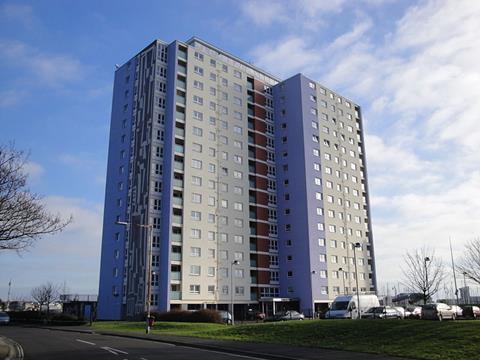Judgment against contractor could ‘provide a steer’ for other cases, experts say
A High Court ruling issued last week could set the norm for future cladding disputes and see more contractors made to pick up the bill for fire safety remediaton works.
In a judgment handed down at the Technology and Construction Court, Essex contractor Mulalley was told to pay damages to housing association Martlet Homes, a subsidary of 50,000-home Hyde Group.
Mulalley had been hired by a previous owner on a design and build contract to install cladding on Gosport Towers in Portsmouth but after the Grenfell fire the system was found to be defective and a fire risk.

According to Theresa Mohammed, a partner at Watson Farley & Williams, the legal ruling – the first confirming that a party in breach of their legal obligations to install safe and compliant cladding is expected to pay compensatory damages – could set the tone for future disputes and provide guidance for litigators.
She said that prior to the judgment, it had been “quite challenging to advise either party in these scenarios”, with little judicial guidance to work on.
“This has resulted in prolonged disputes engaging significant legal teams and experts which has made negotiating settlements more difficult,” she said.
“It is almost like a question of who will blink first: the employer doing everything to protect resident safety and seeking to recover the cost of that; on the other side, the contractor seeking to reduce liability over concerns about the legal merits of the employer’s claim.”
See also>> Housing association wins key legal battle with contractor over faulty cladding liability
See also>>The Building Safety Bill becomes law – here is what you need to know
She said that the ruling in favour of the claimant “could mean that employers’ claims will be taken a lot more seriously” in future disputes.
Despite this, she said, employers “can’t take it as a carte blanche to incur massive costs”, because “it will turn on the interpretation of the contract as well as the relevant regulations”.
“The ruling is also good news for housing associations that shouldered the financial burden of remediating unsafe buildings, which has eaten into their capacity to deliver much needed affordable homes.”
Mary-Anne Bowring, managing director at residential manager Ringley Group
The judge’s decision stated that Mulalley was liable for the cladding replacement costs and the waking watch costs on the basis that it had failed in its role as the designer-specifier of the cladding used, not simply in its installation of the cladding.
According to Simon Ramsden, partner at Norton Rose Fulbright, the firm which represented Martlet, the case involved “a number of issues common to many cladding disputes”, including the responsibility to pay for waking watches.
“The judge’s decisions and reasoning provide a good steer as to how such issues may be resolved in other cases and will hopefully promote earlier resolution of those disputes without the need for long-running litigation,” he said.
Mary-Anne Bowring, managing director at residential manager Ringley Group, said the “landmark” ruling would “give hope to millions” of leaseholders in unsafe residential blocks.
“Leaseholders can now rest assured that Hyde acted properly not only in the first instance by not charging them and that there will be no later cost in the service charge thanks to the recovery via the High Court,” she said.
“The ruling is also good news for housing associations that shouldered the financial burden of remediating unsafe buildings, which has eaten into their capacity to deliver much needed affordable homes.”










No comments yet